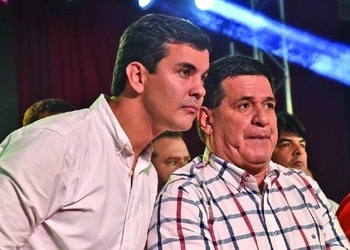Paraguay’s president-elect Santiago Peña and his Colorado Party emerged victorious in the April 30 election, but ties to alleged corruption networks make it unlikely they will pursue reforms that could harm their allies’ interests.
With over 99% of last Sunday’s votes counted, Peña has secured his victory, beating the opposition coalition’s candidate, Efraín Alegre, and the Partido Cruzado’s Paraguayo Cubas, who saw a late surge in support.
Beyond Peña, the Colorado Party took control of both legislative chambers, according to calculations by Paraguayan news outlet, ABC. The party also gained two governorships, and now leads all but two of Paraguay’s 17 departments.
SEE ALSO: Corruption Takes Center Stage in Paraguay Presidential Election
In his victory speech, Peña thanked and hugged his mentor, ex-President Horacio Cartes, and has said previously that he will count on Cartes’ advice while president.
Cartes, who served as president between 2013 and 2018, was sanctioned by the US Treasury Department’s Office of Foreign Assets Control (OFAC) for corruption alongside outgoing Colorado Party vice president, Hugo Velázquez.
InSight Crime Analysis
The Colorado Party’s victory and the closeness of Santiago Peña to Cartes dim the odds of significant progress on corruption, despite renewed efforts. In turn, Paraguay’s entrenched organized crime issues look set to continue.
Emiliano Rolón Fernández took office as Paraguay’s new attorney general in March and has since unfrozen previous cases and opened investigations into Cartes and Velázquez. The new prosecutor may operate with more autonomy and authority than those previously holding the post, providing a reason for optimism.
But with the Colorado Party tightening its already strong grip on the government, investigations will likely struggle to move forward.
“[Fighting corruption] requires decades and a great social commitment that is difficult to achieve without a change in power,” David Riveros García, Executive Director of the Paraguayan anticorruption organization reAcción, told InSight Crime.
SEE ALSO: Paraguay Anti-Marijuana Operations Barely Dent Production in Amambay
Aside from sanctions from the United States, Cartes faces a raft of other criminal accusations. He has been connected to money laundering and drug trafficking, fingered as the head of a cigarette smuggling ring, and accused of working with Brazil’s First Capital Command (Primeiro Comando da Capital – PCC), which has an entrenched presence in Paraguay.
But despite Cartes’ crimes being regarded as an open secret in the country, former Attorney General Sandra Quiñónez never brought charges against him.
Other Colorado Party lawmakers have been linked to international cocaine trafficking involving Brazil’s Red Command (Comando Vermelho), Paraguay’s Insfrán clan, and Uruguayan trafficker Sebastián Marset.
Corruption extends beyond the Colorado Party as well. A network of customs officials was found to let smugglers pass freely across borders. Paraguay’s navy has aided smugglers, and ammunition produced exclusively for the armed forces has made its way into the hands of criminals.
Previous attempts at rooting out corruption have been thwarted. Former Interior Minister Arnaldo Giuzzio, for example, investigated then-President Cartes for cigarette smuggling and money laundering. Shortly after presenting his findings, in which Giuzzio implicated Cartes, he was fired over supposed links to a Brazilian drug trafficker. Giuzzio has not been charged with a crime.
With little changing in Paraguay’s political outlook, organized crime issues seem set to continue. Political elites, including Cartes, are implicated in vast cigarette trafficking networks while marijuana cultivation continues unimpeded despite international police efforts against it. The PCC, involved in marijuana cultivation and linked to the vast volumes of cocaine that move through the country, carries out assassinations against state employees. Despite attempts to take down the gang, Paraguay lacks the state capacity to dismantle the PCC’s transnational operations.

